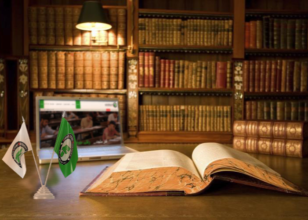Revolutionary Legitimacy: A Civilizational Necessity, Undermining It Weakens Progress!

It is no longer hidden from any rational person that the Syrian individual has become imprisoned behind the bars of laws—psychologically, locally, internationally, and regionally—to the point of being detached from reality!
Logically, based on the political realities we observe, if the “Commission,” hypothetically, were a model citizen and an exemplary student in the United Nations’ classroom, adhering to the law as absolutely as other opposition entities, it is certain, based on what we witness, that it would not have succeeded in breaking the chains of tyranny and leading the Syrian popular movement toward achieving one of its most significant goals! Therefore, popular victory was a result of rebellion, not adherence to the law!
No rational person denies that international resolutions concerning Syria are nothing more than media outcries that have never been implemented over the past years. Instead, they have turned into tools for political, popular, and civilizational exhaustion! However, after the popular movement seized its freedom outside the scope of international law, leveraging the actions of the Commission, the political actors hastened to coordinate functionally with opposition forces frozen politically in the international political bank. It seems, according to the context, that such steps aimed to contain the Syrian popular movement, which had stepped outside the confines of the political actor’s selective laws that sought to enslave the people rather than liberate them!
Of Revolutionary Shame
I contend that it was a mark of revolutionary shame and a lack of political acumen for the National Coalition and its blocs to welcome the statement issued by the “Aqaba Conference,” whose eighth clause mandates a commitment to combating terrorism without precisely specifying the concerned or targeted parties. It is well known that the new Syrian administration, which led the popular movement during liberation, is categorized as terrorist. This welcome effectively marked the beginning of legitimizing a declaration of war on the popular movement or represented a dishonorable attempt to blackmail the political competitor who had militarily and popularly overturned the regime. The Syrian political opposition failed to consider the repercussions of this welcome on the stability of the Syrian situation and the preservation of Syrian lives.
Therefore, the National Coalition ought to have been courageous and astute, focusing on the popular base instead of relying on external forces against the popular movement. It should have demanded the removal of the Syrian administration from the terrorism classification, even at the expense of its own political empowerment. Preventing pretexts and saving the Syrian people—still being claimed by political actors under the pretext of terrorism—should have taken precedence!
It has become evident that international law is not designed to ensure justice and rescue for the weak but to legitimize the behaviors of the dominant. Thus, if you wish to be lawful in the realm of politics, you must establish yourself outside the framework of the law to later become part of the law and the political machinery! Strangely, the National Coalition and its affiliates stand alone in failing to capitalize on the shifts in international political and military alignments to expand their scope and seek a position starting from the essence of the popular revolution rather than serving the interests of other states, neither excessively nor negligently. However, it appears that they have been fully domesticated to the extent that they are no longer capable of discerning the compass, the civilizational roadmap, or the sources of their strength! They persist in being ambassadors of the world to the popular movement rather than ambassadors of the popular movement to the world. Such irresponsible behaviors and the insistence of the political opposition abroad on ignoring internal dynamics and depending on external forces shift them from the realm of political revolution to the realm of competing for servitude under the auspices of the external political actor!
Restructuring the Opposition
A glance at the history of the emergence of these entities clarifies the idea: since the outbreak of the Syrian popular movement, the international actors have hastened to structure Syrian opposition institutions at all levels and types in a way that makes them politically employable rather than politically transformative or capable of leading and engaging with the popular movement to achieve its goals. Political, social, and revolutionary figures were gathered within contradictory coalition frameworks that became arenas of internal conflict and attrition between opposing ethnic and partisan forces. This facilitated control by influential states over political entities in ways that perpetuate conflict, reinforce authoritarianism, and undermine society.
The international community has treated the Assad regime as the operational system intended to govern Syria, while opposition structures have functioned more like an “antivirus,” merely preventing the operational system from being infiltrated by the popular tide, which, by the nature of the revolution, was on the verge of self-organization. Consequently, international powers legitimized decisions and hindered the organization of the popular movement by co-opting national figures and placing them within political opposition entities that falsely perceive their influence in the political arena. In reality, they are being exploited, politicized, and rendered ineffective without even realizing it.
It is evident that international powers recognize the potential danger of interaction between Syrian elites and the popular movement if it occurs outside the framework of international political will. From this, we understand these powers’ strategy of abducting Syrian elites while simultaneously freezing Syrian political “eggs” for later use, aligning with international political agendas rather than the Syrian social actor. This is precisely what we observe today. It implies that international political forces have paralyzed thousands of national elites in recent years to entrench conflict and prevent the formation of a political-social force aligned with the Syrian political movement that could lead to Assad’s overthrow and the establishment of a new civilizational and cultural foundation rooted in social revolutionary legitimacy, not external political or constitutional legitimacy.
This is particularly significant in an era dominated by the scourge of political realism, which has become akin to concealed occupation or a secure social cage that imprisons the will of intellectuals, scientists, elites, the public, and social and intellectual leaders behind legal, political, and cultural bars. Political realism implies that elites and the general public believe in the impossibility of political and social change or liberation except within the confines of the oppressor’s approval.
The Scourge of Political Realism
It is clear to any rational person that the scourge of political realism, which the tyrant designs in its details, subjugates human, popular, and elite will and behavior through a system of imported and pre-manufactured “legitimate” cultural and legal containers. These containers are responsible for overseeing the design of collective thinking and behavior in subjugated societies. In this way, we face the creation of a project for a political god and millions of dervishes and slaves who glorify the tyrant and political criminal under the rituals of voting boxes, unaware that freedom must be seized and that a tyrant does not grant freedom to a slave.
Strangely, after the revolutionaries of the popular movement liberated their country, intellectuals began to circulate the description of the resulting social authority as a “de facto” authority that must be changed as soon as possible, claiming it is a negative authority and internationally illegitimate, because it did not follow the legal democratic process to reach political power. There is no doubt that such calls appear to be a positive civilizational call, but in reality, they represent a civilizational setback, a social undermining, and an irresponsible resistance to the human intellectual struggle. The essence is that the international political actor must reconcile with the will of societies, respecting human freedom and the right to think collectively and live a civilization emanating from its intellectual movement, not from the intellectual movement organized by the political actor using tools of oppression, military, legal, media, and educational tyranny. Thus, the concept of “de facto” authority does not apply to the Syrian liberation forces, but rather to international powers with political influence beyond borders.
Ultimately, the new Syrian administration, as previously recognized, should understand that the revolutionary phase is not led by conflicting movements and requires a strategy of self-isolation. However, it must be confident that the next phase of national building, directly following the revolution’s victory, must begin with a strategy to activate the social revolutionary legitimacy, consciously opening up to technocrats, elites, and the political environment, and combating the idea of sectarian quotas under the pretext of reassuring minorities. Additionally, there must be a necessity to neutralize political entities without real social weight, which external forces seek to transform into Trojan horses, while ensuring the participation of their kidnapped elites without excluding anyone.
Political Office
Dr. Alaa Rajab Tabab
Research and Studies Department
Independent Researchers
Syrian Future Movement






